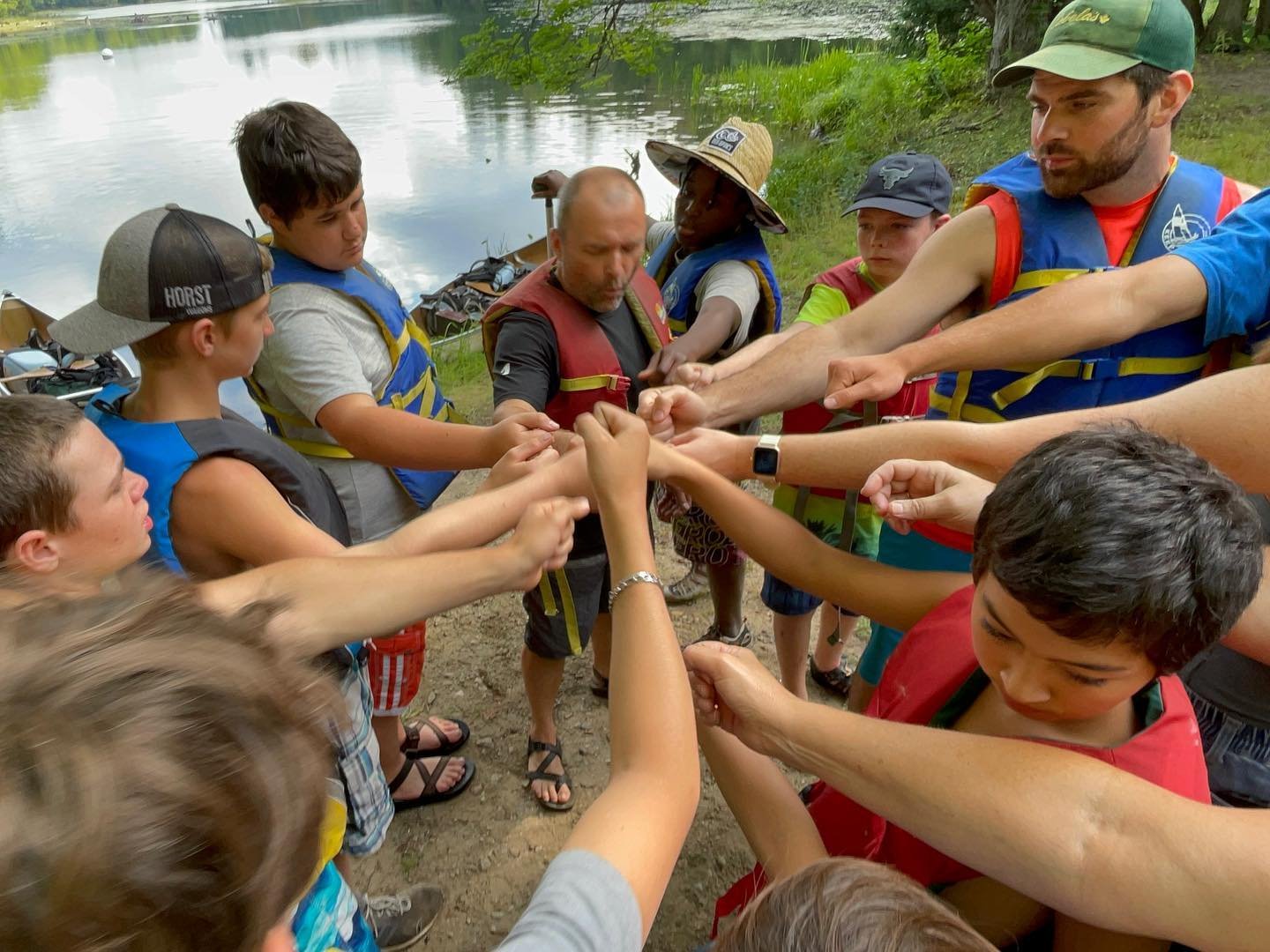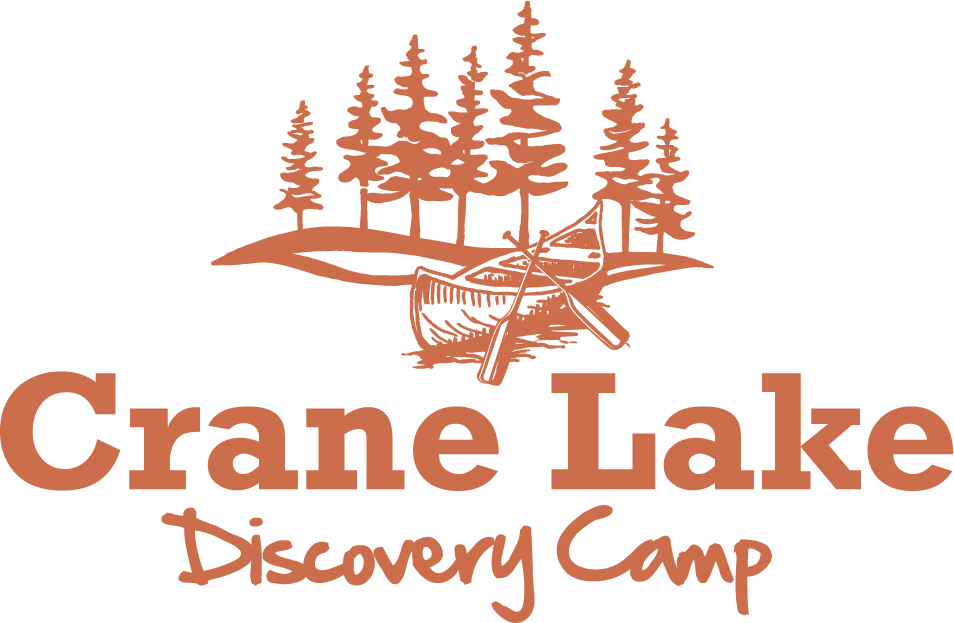
Group work
Group work: the heart of camp
When a boy comes to camp, he joins a group of up to 10 boys and 2 counsellors. They do everything together.
They repeat their group slogan often: “Everything we do, we do as a group. Everything we do, we do with a good attitude.”
Through group work, boys learn:
to wait for each other
to consider others
to work together
to speak honestly
to take responsibility when their actions affect others
to listen to each other
to help each other
What is group work?
Group work is a method of solving individual problems together as a group. Group members reflect on each other’s actions and reactions, teaching and learning from each other. It is a common and effective type of therapy, often used in weekly meetings.
At Crane Lake Discovery Camp, group work happens around the clock. The boys live as part of a group, with counsellors mentoring and teaching skills as they go through tasks of daily living.
As a group, they share a common goal of rising to the challenge of wilderness living. Daily rhythms of plan, do, and evaluate lead them through the day.
The group makes a plan at the start of every week. As they do their plan, they stop to problem solve each time they run into an obstacle, whether it’s a broken tool or a behaviour. At the end of every day, they meet over a campfire to evaluate how the group functioned in meeting its goals.
Each boy has a voice in everything they do. The counsellors draw the boys out, helping them find words for things they have maybe never articulated. Their group “family” is a safe environment for vulnerability, and they learn to speak freely and candidly with each other.
Any skill is clumsy and hard the first time through, but through repeated use, the boys gain confidence and skill in speaking up and solving problems. Because they practice these skills every day—in everyday life—they can adapt these skills to other situations and use them for the rest of their lives.
“There are ten boys in a group and all of them are involved in every decision that is made affecting their life…food, shelter, recreation. The group decides what needs to be done and organizes to do it. …The group process is used all the time. It’s a way of life, not just a tool employed occasionally as “therapy”. It is a consciously-guided group discussion used in setting goals, determining procedures, evaluating performances, solving a problem or establishing norms of behaviour.”
—Campbell Loughmiller
Essential aspects of group work
Goals
Goals are essential because without them, there is no success. A boy might do something, but if he hasn’t set out to do it, he won’t feel a sense of conquering or completion. Goals create success and are used in measuring progress.
“Psychologically, it means more to a boy to do something in relation to a thought-out plan than twice the accomplishment would mean without one.”
—Campbell Loughmiller
Before a boy comes to camp, he decides on his own individual goals, with the help of camp staff and his caregivers. These goals could be as simple as catching a fish or making a friend.
At camp, the group decides what goals they’d like to accomplish. Sometimes it is building a new tent, or a fishing trip, or a longer canoe trip. The goals are decided by the group, not imposed by external authority figures.
It’s important that the goals are realistic so that the boys can experience success. Counsellors help calibrate goals to bring success. Instead of disagreeing with a goal that is unrealistic, they introduce logic, teaching methods of evaluation.
What do we need to accomplish this task?
Are we ready for this?
Do we need to try a smaller version of it first to test it out?
Each boy learns to take ownership of his own goals and the group’s goals. Each time he accomplishes a goal and experiences success, his confidence grows.
“We try to reverse the series of failures the boys have experienced and to introduce as many successes into their lives as possible. …Even though the accomplishments may be small in themselves, they add up to an ever-growing picture of adequacy and self-confidence.”
—Campbell Loughmiller
Plan
At the beginning of the week, the group makes a plan based on shared and individual goals.
They plan what tasks they need to do to keep their campsite operating effectively, plan their recreational activities, map out a schedule, and plan their menu for their weekly “cookouts” at the campsite.
Each boy has a voice in deciding their plan.
The role of the counsellor is to help the boys make a realistic plan, adjusting their plan to bring success.
Do
The group follows through on their plan. The plan becomes the supervisor, not the adults around the boys.
They repeat their group slogan often: “Everything we do, we do as a group. Everything we do, we do with a good attitude.” All are expected to contribute as they work through their plan.
The boys learn to follow through on plans, to work hard, and to help each other for the good of the group, so the whole group will succeed. They learn a good work ethic.
The group has freedom to fail and freedom to succeed. The group makes their plan and follows it through, learning and adjusting future plans as they learn from their experiences.
Problem Solving
When a fight or disruptive behaviour happens, the group stops what they are doing. Solving the problem together is more important than any other scheduled activity.
The counsellor helps keep the focus off blaming and on helping each other by asking questions like, “How many of you have had a problem like that?” and “Do you remember anything that helped you overcome it?”
The boys learn through trial and error how to address problems, how to speak up, and how to negotiate solutions.
“Although we cannot make a boy do anything, we do not let his negative behaviour go unnoticed. He cannot just walk away when he is finished. He has to take responsibility for his behaviour, face the reaction of his buddies and the counsellors; but all of them are his friends. He is not coerced. His dignity is not affronted. He is not mistreated…his peers face him squarely and forcefully. He is not shielded from anything, but he is supported by everything.“
—Steve Ashton
Evaluate
At the end of each day, the group gathers around a campfire to evaluate their day.
They ask, “How did the day go? How did we do as a group? What is slowing us down from reaching our goals? Is there anything we can improve tomorrow?”
The boys speak candidly and freely with each other, with the counsellors guiding the conversation and setting a tone of helping each other. The counsellors draw out quiet boys, and help them articulate thoughts and feelings. Others are encouraged to wait and listen.
It is hard to speak truth and to listen to honest feedback that might be painful. They learn to trust each other and depend on each other.
“The campfire is one of the places where they learn to express their feelings without heated emotion. It enables a boy to participate in evaluative conferences with his parents and the camp staff, with the feeling that his voice is just as important as anyone else’s.”
—Campbell Loughmiller








